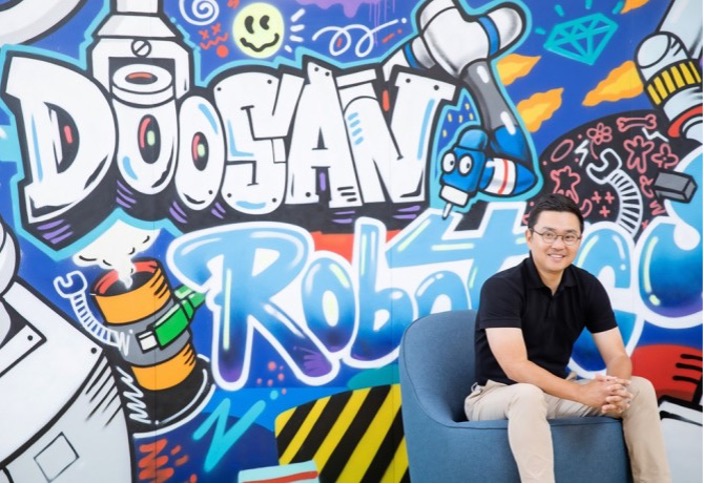
- News & Analysis
- Home
- Global Corporate Venturing
- Global University Venturing
- Latest News
- Publications
- Podcast
- The CVC Funding Round Database
- The CVC Directory
- Video
- Subscribe
- Newsletters
- Events
By Maija Palmer and Edison Fu
FEATURESouth Korea’s rapid-growth tech ecosystem turns to AI and batteriesAt the beginning of October, Doosan Robotics, an eight-year-old company that makes “co-bots” that can work alongside humans, wowed investors with a stock market debut that raised $310m and valued the company at more than $1.25bn.
It was Korea’s largest IPO since battery maker LG Energy Solution listed in January 2022, and paves the way for several other technology companies to follow suit with listings. While the technology markets in Europe and the US are just starting to open up again after a long lull, South Korea is already moving ahead at pace.
It is little wonder — Korea has one of the fastest-growing ecosystems in the world, says Alberto Onetti, chairman of management consulting firm Mind the Bridge.
“10 years ago, it was simply non-existent – now it has the size of countries like Germany and France,” he says.
The country has 1,214 scaleup-sized companies, a 35% increase from 2020. Capital investments more than doubled over the same period reaching the cumulative volume of $48.2bn, according to Onetti’s calculations.
Shift from life sciences to AI
The Korean startup landscape has undergone a big transformation over the past decade, says Junsung Bae, executive director of Lotte Ventures, the investment arm of conglomerate Lotte Group, whose businesses span everything from confectionary to hotels and chemicals. “Initially, there was a strong emphasis on life sciences startups, which gained considerable attention during their nascent stages,” he says.
But now there has been a shift toward startups dedicated to innovative drug development, artificial intelligence (AI) and secondary batteries.
Lotte Ventures is one of South Korea’s most prolific investors. It started in 2016 as an accelerator programme and then developed into a full investment unit, having now taken stakes in more than 250 companies. Bae says his investment team is now prioritising startups in biotech, healthcare and urban air mobility. Some of its notable portfolio companies include Virnect, an industrial extended reality company, gaming developer Haegin, and drone startup Pablo Air.
It’s also looking beyond Korea’s borders, considering startups in retail, biotech and secondary batteries from abroad.
Onetti say that AI and its industrial applications are particularly prominent in the Korean startup ecosystem, with key sectors like mobile, healthcare and manufacturing having substantial deployments.
Korean artificial intelligence company Pulse9, for example, recently launched a virtual avatar, powered by deepfake technology, called Zaein, which looks like a real woman and can sing and advertise clothes.
Lotte Ventures, meanwhile, has invested in a similar startup, called 4by4, which has created a virtual live commerce influencer called Lucy. Not only is there some collaboration between the startup and Lotte business units — the character is used for sales at Lotte Home Shopping — the business is also planning a stock market listing.

New York, USA – 26 April 2021: Lotte Corporation logo close-up on website page, Illustrative Editorial The arrival of generative AI is giving South Korea’s robotics companies a new boost. Doosan Robotics, for example, is partnering with Microsoft to see if the GPT language model can be combined with robots to create machines with the ability to understand voice commands and context.
Lotte Ventures’ portfolio also includes AniAI, which specialises in automated hamburger preparation and food quality control. Its robot, Alpha Grill, cooks about 200 burger patties an hour, through a vision sensor.
The rise of the metaverse and gaming technologies have been on the rise due to Korea’s dominant position in esports. Nonetheless, the evolution of the metaverse is uncertain, as Kakao and Com2Us have recently announced staff reductions in their metaverse subsidiaries.
VC deals in Korea have come down from the extreme highs of 2021 and 2022. But the amount of capital invested in startups is still higher in 2023 than it was in 2020, despite the year not being quite over yet. The number of deals is smaller, implying that we are seeing investors placing bigger bets on emerging companies, in line with Onetti’s findings that the number of scaleup companies is rapidly growing.

A new wall of CVC money
One of the factors driving startup growth in Korea is the emergence of many new corporate venture units following a regulatory change. At the end of 2021, a law prohibiting Korean conglomerates, or chaebols, from establishing financial firms, was lifted, setting the scene for many more CVC units to be set up.
Although the law change only affects several conglomerates that have holding companies, it has triggered many corporations to establish their own investment arms. At least 20 to 30 CVCs have been created by financial companies, midsized companies and unicorn startups in the past several years and some 32% of the country’s 76 industrial conglomerates now have a CVC arm.
While many of the large, global South Korean companies like Samsung and LG have had corporate venture units for several years (many of them, like Samsung and LG, based in Silicon Valley) but now much smaller companies are investing.
The Pinkfong Company, a media group that created viral hit song Baby Shark, for example, has become an investor in several younger media companies.
Xplor Investment, founded in 2022, is another of this new crop of CVC units formed after the regulatory change. The unit is the investment arm of construction firm GS Engineering & Construction and seeks startups in property and construction technologies, aligning with the parent company’s smart city and sustainability focus. It is also looking at technologies addressing the problems of an ageing population.
Xplor is an example of the professionalisation that is coming in as the number of CVC units grows. Jong Hoon Lee, CEO, says Xplor Investment aims to operate like an independent VC firm, investing not just in startups closely aligned with the parent corporation but also prioritising financial returns.
“If CVC works too strategically, it often has difficulties in terms of performance and securing manpower,” says Lee. “To be a successful CVC, one must first be an excellent VC.”
More money coming into the system
In October, the CVC Committee was established, representing a consortium of Korean CVC firms. The committee consists of 53 venture capital companies, including investment arms of prominent corporations like GS, CJ and POSCO. The primary role of the CVC Committee is to act as a vital communication bridge between the CVC industry and various government bodies in South Korea, including investment and antitrust authorities. It is also expected to spearhead CVC policy initiatives in the region.
In addition, the South Korean government has outlined its intentions to amend relevant legislation with the aim of boosting the CVC sector’s contribution to the Korean venture ecosystem to surpass 30% by 2027. These plans involve streamlining the operations of the 9 trn KRW Korea Fund of Funds to make it more CVC-friendly, alongside the development of new fund programmes tailored to support CVC initiatives.
At the end of August the Korean government announced plans for a Krw 2trn Startup Korea Fund, which will invest in deeptech startups in areas such as such as artificial intelligence and semiconductors.

Startup success stories
The emergence of several high-profile unicorns has driven interest among large Korean corporates in the startup ecosystem.
Korean startups that have developed into businesses valued at more than $1bn include e-commerce company Coupang, entertainment and gaming business Bluehole, media company Yello Mobile, smartphone app developer Woowa Brothers, and cosmetics and pharmaceutical maker L&P Cosmetic.
Many of these companies are themselves becoming investors. Krafton, the parent company of Bluehole, recently established a gaming incubator in India.
Immediately after the IPO of Doosan Robotics, meanwhile, CEO Wiiliam Ryu was already talking about using part of the money raised for mergers and acquisitions. The latest crop of tech success stories is wasting no time in seeding the ground for the next crop of Korean startups to grow.
All information provided by Global Corporate Venturing in this report is for information purposes only and does not constitute
investment advice.
Healthcare | Human microbiome
Publications | Reports | GCV
Korea plans $1.5bn fund to support deep tech startupsThe new fund is part of a recent raft of measures to attract foreign investment in the country's venture capital sector.
A third of Korean conglomerates now have investment armsThe Korean government aims to kickstart innovation and encourage M&A among its system of chaebol after deregulating the sector.
South Korea’s innovation ecosystem is on fireSouth Korea's innovation economy is outperforming countries like France and Germany and corporate investors are playing a key role.
Read the full report on your tablet or device.Download PDFAbout us
GCV provides the global corporate venturing community and their ecosystem partners with the information, insights and access needed to drive impactful open innovation. Across our three services - News & Analysis, Community & Events, and the GCV Institute - we create a network-rich environment for global innovation and capital to meet and thrive. At the heart of our community sits the GCV Leadership Society, providing privileged access to all our services and resources.
Navigation
 test reg
test regLogin
Not yet subscribed?
This website uses cookies to improve your experience. We'll assume you're ok with this, but you can opt-out if you wish.Accept Read MorePrivacy & Cookies PolicyPrivacy Overview
This website uses cookies to improve your experience while you navigate through the website. Out of these, the cookies that are categorized as necessary are stored on your browser as they are essential for the working of basic functionalities of the website. We also use third-party cookies that help us analyze and understand how you use this website. These cookies will be stored in your browser only with your consent. You also have the option to opt-out of these cookies. But opting out of some of these cookies may affect your browsing experience.Necessary cookies are absolutely essential for the website to function properly. This category only includes cookies that ensures basic functionalities and security features of the website. These cookies do not store any personal information.Any cookies that may not be particularly necessary for the website to function and is used specifically to collect user personal data via analytics, ads, other embedded contents are termed as non-necessary cookies. It is mandatory to procure user consent prior to running these cookies on your website.






